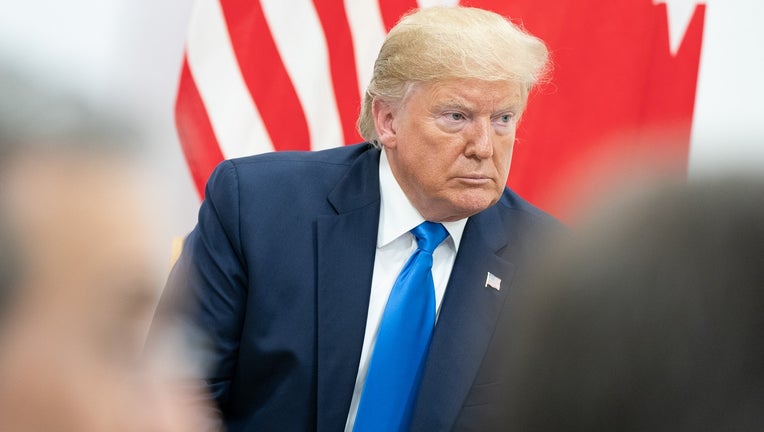Diplomat told Ukraine aid held up for corruption probe

President Donald Trump (Official White House photo by Shealah Craighead)
WASHINGTON - House investigators released more transcripts Tuesday in the impeachment inquiry of President Donald Trump, including hundreds of pages of testimony from two top diplomats deeply involved in the Ukraine matter.
Kurt Volker, the former special envoy to Ukraine, and Gordon Sondland, the U.S. ambassador to the European Union, were involved in White House policy toward Ukraine and aware of the July 25 phone call between Trump and Ukraine President Volodymyr Zelenskiy that's central to the impeachment inquiry.
Sondland revised his testimony in his transcript, acknowledging that he understood by September that American aid to Ukraine was linked to the Ukrainians making a public statement promising to investigate corruption in their country.
Sondland says his memory was refreshed by the opening statements of two other key witnesses who have testified in the impeachment inquiry.
Specifically, Sondland says he now recalls a conversation in Warsaw with a top aide to the Ukrainian president in which Sondland said that resumption of military aid likely would not happen until the country had issued a public statement vowing to fight corruption. In a call over the summer, Trump had linked that request to investigating Joe Biden and the Democrats.
Sondland also told investigators Trump nearly hung up on him when he asked whether the White House was withholding military aid for Ukraine as it pushed the East European ally for an investigation of Democrats, according to the diplomat's testimony.
"I want nothing. I want no quid pro quo," Trump said, according to Sondland. "I want Zelenskiy to do the right thing."
Sondland said Trump was in a "bad mood." The diplomat said, "I wouldn't say he hung up me, but it was almost like he hung up on me."
RELATED COVERAGE:
- Key takeaways from Trump impeachment inquiry transcripts
- Mueller documents: Manafort pushed Ukraine theory on DNC hack
- Going after investigators: Criminal review of Russia probe
- Top Trump adviser steps down ahead of impeachment testimony
The release of the transcripts comes as investigators announced they want to hear from Trump's chief of staff, reaching to the highest levels of the White House as they prepare to release more transcripts from the closed-door proceedings.
Investigators say Mick Mulvaney's news conference last month amounted to "nothing less than a televised confession" of Trump's efforts to have Ukraine investigate Democrats and Biden as the White House was blocking military funding for the Eastern European ally.
Trump says he did nothing wrong, and Mulvaney later walked back his remarks.
Rep. Adam Schiff, D-Calif., the chairman of the Intelligence committee, said the panels are releasing the word-by-word transcripts so the American public can see it all for themselves.
"This is about more than just one call," Schiff wrote Tuesday in an op-ed in USA Today. "We now know that the call was just one piece of a larger operation to redirect our foreign policy to benefit Donald Trump's personal and political interests, not the national interest."
The White House has instructed its officials not to comply with the impeachment inquiry being led by House Democrats. It is uncertain if Mulvaney will appear.
Public hearings could begin as soon as next week in the impeachment inquiry that Trump says is illegitimate and Republicans in Congress call a sham.
The release of more transcripts comes as the Trump administration resumes its stonewalling of the inquiry. Two more White House officials, an energy adviser and a budget official, declined to appear Tuesday before investigators, even after one received a subpoena.
Most of those who have testified before the House panel are from the ranks of the State Department, including recalled U.S. Ambassador to Ukraine Marie Yovonavitch, whose testimony was released Monday. Diplomats have testified to the mounting concerns in the State Department over Trump's interest in having a foreign ally investigate Biden.
Volker and Sondland both testified they were disappointed after briefing Trump at the White House upon their return from Zelenskiy's inauguration in May as a new leader of the young democracy vowing to fight corruption.
That pivotal May 23 meeting raised red flags when Trump told them to work with Rudy Giuliani, his personal attorney, on Ukraine issues.
Text messages from the two men, along with another diplomat, William Taylor, who also testified in the impeachment inquiry, revealed in striking detail the administration's actions toward Ukraine.
___
Associated Press writers Eric Tucker, Colleen Long, Matthew Daly, Alan Fram, Ben Fox, Padmananda Rama and Matthew Lee contributed to this report

